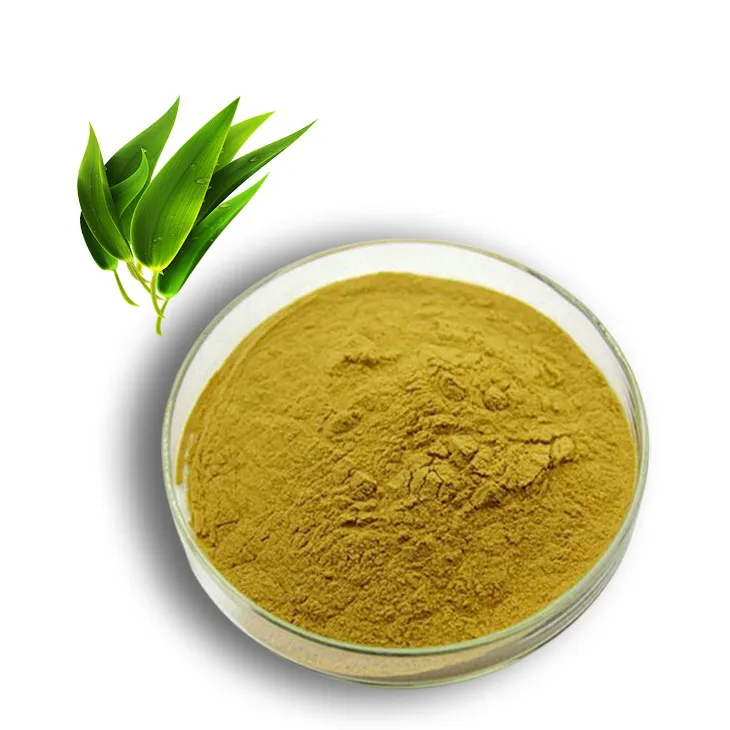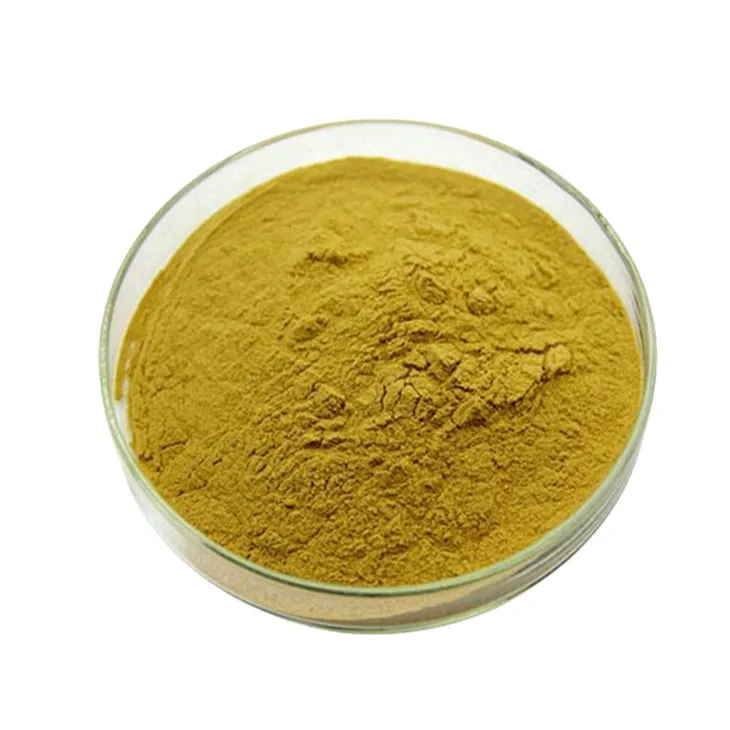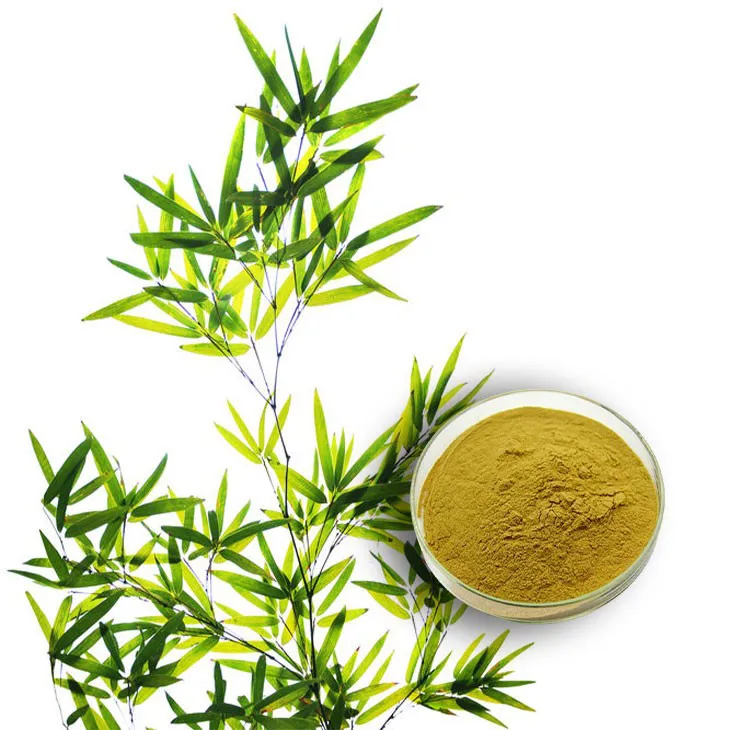- 0086-571-85302990
- sales@greenskybio.com
Certified organic bamboo leaf extract.
2024-12-02

1. Introduction
The certified organic Bamboo Leaf extract has emerged as a remarkable natural ingredient in various fields. Bamboo, a plant known for its rapid growth and versatility, offers much more than just its structural uses. Bamboo leaves, in particular, are a valuable source of beneficial compounds. Through careful processing, the extract is obtained and then certified as organic, which sets it apart in the market.

2. Composition of Bamboo Leaf extract
Bamboo Leaf extract is a rich storehouse of various phytochemicals.
2.1 Flavonoids
Flavonoids are a major component of the bamboo leaf extract. These compounds are well - known for their antioxidant properties. They help in neutralizing free radicals in the body, which are harmful substances that can cause cell damage and are associated with various diseases such as cancer and heart disease. In plants, flavonoids also play a role in protecting the plant from environmental stresses such as UV radiation and pathogen attacks.
2.2 Phenolic Acids
Phenolic acids are another important group of phytochemicals present in bamboo leaf extract. They contribute to the overall antioxidant activity of the extract. Additionally, phenolic acids have been shown to have anti - inflammatory properties. In the context of plant growth, they may be involved in signaling pathways that regulate plant development and response to environmental cues.

3. Applications in the Agricultural Sector
The certified organic bamboo leaf extract has significant applications in agriculture.
3.1 Organic Growth Enhancer
It can be used as an organic growth enhancer for plants. When applied to plants, it promotes their overall health. This is achieved through several mechanisms:
- Nutrient Uptake: The extract may enhance the plant's ability to take up nutrients from the soil. For example, it could improve the efficiency of root systems in absorbing essential minerals such as nitrogen, phosphorus, and potassium.
- Photosynthesis: By influencing certain physiological processes in plants, it may boost the rate of photosynthesis. This is crucial as photosynthesis is the process by which plants convert sunlight into energy, which is then used for growth and development.
- Stress Tolerance: It helps plants to better tolerate environmental stresses. This includes resistance to drought, as the extract may assist in maintaining water balance within the plant. It also aids in withstanding temperature fluctuations and soil salinity.
3.2 Disease Resistance
Another important aspect of using bamboo leaf extract in agriculture is its ability to enhance plant resistance to diseases. The phytochemicals present in the extract, such as flavonoids and phenolic acids, have antimicrobial properties. They can act against a variety of plant pathogens, including fungi, bacteria, and viruses. For instance, they may inhibit the growth and spread of fungal spores on plant surfaces, thereby reducing the incidence of fungal diseases.

4. Role in Alternative Medicine
In the realm of alternative medicine, the certified organic bamboo leaf extract has been the subject of numerous studies.
4.1 Regulation of Body's Internal Balance
It is believed to have the ability to regulate the body's internal balance. In traditional medicine concepts, the body's internal environment needs to be in a state of harmony for optimal health. The extract may contribute to this balance in several ways:
- Hormonal Regulation: There is some evidence to suggest that it may influence hormonal levels in the body. For example, it could help in maintaining the proper balance of hormones related to metabolism, such as thyroid hormones.
- Immune System Support: By modulating the immune system, the extract may help the body to better defend itself against diseases. It could enhance the activity of immune cells, such as white blood cells, which are responsible for fighting off infections.

5. Environmental Aspects of Organic Production
The organic nature of the bamboo leaf extract is of great significance from an environmental perspective.
5.1 Soil Health
Organic production of bamboo leaf extract respects soil health. Organic farming practices used in the cultivation of bamboo ensure that the soil is not depleted of its nutrients. Instead of relying on synthetic fertilizers, organic matter is added to the soil, which improves its structure and fertility. This, in turn, benefits not only the bamboo plants but also the surrounding ecosystem. For example, healthy soil supports a diverse community of soil organisms, such as earthworms and beneficial bacteria, which play important roles in nutrient cycling and soil aeration.
5.2 Biodiversity
Organic production also takes into account biodiversity. Bamboo plantations that are managed organically provide habitats for a variety of wildlife. Birds, insects, and small mammals can find shelter and food sources in these areas. Moreover, by avoiding the use of pesticides and other harmful chemicals, organic bamboo cultivation helps to protect the natural balance of the ecosystem. This is crucial as biodiversity is essential for the stability and functioning of the planet's ecosystems.
6. Commercial Significance
The certified organic bamboo leaf extract holds great commercial significance in international markets.
6.1 Unique Properties and Demand
Its unique properties, such as its rich phytochemical composition and its multiple applications in different fields, have led to an increasing demand. Consumers are becoming more interested in natural and organic products, and the bamboo leaf extract fits this trend perfectly. In the cosmetic industry, for example, it is being used in skincare products due to its antioxidant properties. In the food and beverage industry, it may be added as a functional ingredient for its potential health - promoting effects.
6.2 Quality Assurance and Marketability
The certification of the extract as organic gives it a distinct edge in terms of quality assurance and marketability. Certification provides consumers with the confidence that the product has been produced according to strict organic standards. It ensures that the extract is free from harmful pesticides, genetically modified organisms (GMOs), and other contaminants. This makes it more appealing to consumers who are conscious about the quality and origin of the products they purchase. As a result, products containing certified organic bamboo leaf extract can often command a higher price in the market.
7. Conclusion
In conclusion, the certified organic bamboo leaf extract is a multi - faceted natural ingredient with a wide range of applications. Its composition of phytochemicals makes it valuable in agriculture, alternative medicine, and other fields. The organic production methods ensure environmental sustainability, while its commercial potential continues to grow. As research on this extract progresses, it is likely that even more applications and benefits will be discovered in the future.
FAQ:
What are the main phytochemicals in certified organic bamboo leaf extract?
The main phytochemicals in certified organic bamboo leaf extract are flavonoids and phenolic acids.
How can certified organic bamboo leaf extract be used in the agricultural sector?
In the agricultural sector, it can be used as an organic growth enhancer for plants. It promotes plant health and their resistance to diseases.
What is the significance of the organic certification for bamboo leaf extract?
The organic certification means it is produced in an environmentally - conscious manner, respecting soil health and biodiversity. It also gives it an edge in terms of quality assurance and marketability.
Has certified organic bamboo leaf extract been studied in alternative medicine? What are the findings?
Yes, it has been studied in alternative medicine. It has been studied for its ability to regulate the body's internal balance.
Why is certified organic bamboo leaf extract in increasing demand in international markets?
It is in increasing demand in international markets for its unique properties.
Related literature
- The Phytochemical Composition and Bioactivities of Bamboo Leaf Extracts"
- "Organic Certification: Standards and Benefits for Natural Extracts"
- "Bamboo Leaf Extract in Agricultural and Alternative Medicine Applications"
- ▶ Hesperidin
- ▶ citrus bioflavonoids
- ▶ plant extract
- ▶ lycopene
- ▶ Diosmin
- ▶ Grape seed extract
- ▶ Sea buckthorn Juice Powder
- ▶ Beetroot powder
- ▶ Hops Extract
- ▶ Artichoke Extract
- ▶ Reishi mushroom extract
- ▶ Astaxanthin
- ▶ Green Tea Extract
- ▶ Curcumin Extract
- ▶ Horse Chestnut Extract
- ▶ Other Problems
- ▶ Boswellia Serrata Extract
- ▶ Resveratrol Extract
- ▶ Marigold Extract
- ▶ Grape Leaf Extract
- ▶ blog3
- ▶ blog4
-
The best lemon juice powder in nature.
2024-12-02
-
Organic Vitamin K2 Powder Suppliers
2024-12-02
-
Bulk purchase of L - tyrosine.
2024-12-02
-
Vitamin K2 Manufacturers
2024-12-02
-
100% Pure Natural Rutin.
2024-12-02
-
Chinese Citrus Bioflavonoid Suppliers.
2024-12-02
-
Yellow Pine Extract
2024-12-02
-
Stevia Extract
2024-12-02
-
Mulberry Extract
2024-12-02
-
Cactus Extract
2024-12-02
-
Lemon Balm Extract
2024-12-02
-
Quercetin
2024-12-02
-
White Peony Extract
2024-12-02
-
Fenugreek Extract Powder
2024-12-02
-
Curcumin Extract
2024-12-02
-
Eucommia Ulmoides Extract
2024-12-02





















